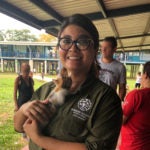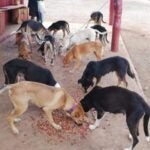
SAN JOSE—A study of street dog and cat populations conducted by animal welfare organization Humane Society International in nine key areas in Costa Rica has revealed that animal numbers are starting to decrease in some urban areas thanks to spay and neuter programs.
Conducted in July and August last year in four urban, three rural and two coastal sites, the study involved counting street dog and cat numbers (both those with and without an owner), as well as household surveys in the Montes de Oca, Curridabat, La Union and Cartago districts, rural areas adjacent to the Greater Metropolitan Area, and the San Francisco and Tortuguero communities in Pococi, Limon province.
Andrea Borel, executive director of HSI/Latin America, says: “The study allowed us to identify and compare dog and cat populations at these sites, as well as the current status of sterilization and vaccination in urban and rural locations. We were also able to see how these roaming dogs and cats interact with people and other animals, including wildlife. What we found was a quantifiable decrease in dog populations in those areas where sterilization is most common and a high level of sterilization in urban areas. This is vital data that will help HSI collaborate with existing animal welfare programs in Costa Rica to achieve sustainable change through humane dog and cat population management, affordable and accessible sterilization, preventative veterinary care, public education and a strengthened culture of responsible pet ownership.”
A total of 2,168 household surveys were conducted in combination with early morning street counts of animal numbers. A team of researchers used HSI’s specially developed mobile phone application to accurately record the location of each dog and cat and calculate the total number of roaming animals on each street. The teams also assessed the visible health status of each animal. By replicating pre-defined Google routes surveyed in 2014, HSI was able to demonstrate that the street dog population density has decreased in some urban areas in Costa Rica where spay and neuter is most common. In some areas the survey revealed a more than 80% dog sterilization rate.
Free-roaming dogs and cats, when present in high density, may face serious welfare issues, such as starvation, disease and untreated injuries. At worst, they may also compromise public safety and environmental health, and contribute to the deaths of other animal species. A decrease in dog density is often an indicator of the effectiveness of animal welfare and sterilization programs developed by private and public institutions, particularly in areas where the municipality has an active role.
Other relevant survey findings included:
- A high level of sterilization of dogs and cats, mainly in urban districts such as Montes de Oca (81%). Additionally, 86% of cats reported in urban areas were sterilized, compared to 63% in rural areas.
- The majority of households said they had sterilized their companion animals in private clinics (63%), although sterilization campaigns prevailed in three rural areas.
- Companionship is the main reason for having a dog (96% in urban areas and 91% rural), followed by personal/property protection, which is more common in rural areas.
- Most people acquire an animal as a gift from a friend or relative (62% in urban areas and 48% rural), followed by rescuing them from the street.
- Cases of animal cruelty often go unreported, with the main barriers to reporting being an unwillingness to get involved, the perception that it is not the individual’s responsibility to report cruelty, and lack of knowledge how and where to report it.
- There are complex interactions between free roaming dogs and cats and wildlife. Although specific wild animal species involved varied from area to area, the most common interaction cited was dogs and cats hunting small animals.
- The percentage of households where someone had been bitten by a dog was noticeably lower compared to other Latin American countries studied by HSI (Mexico and Chile).
ENDS
Media contact: Alejandra Zúñiga ; alezuniga@outlook.com


